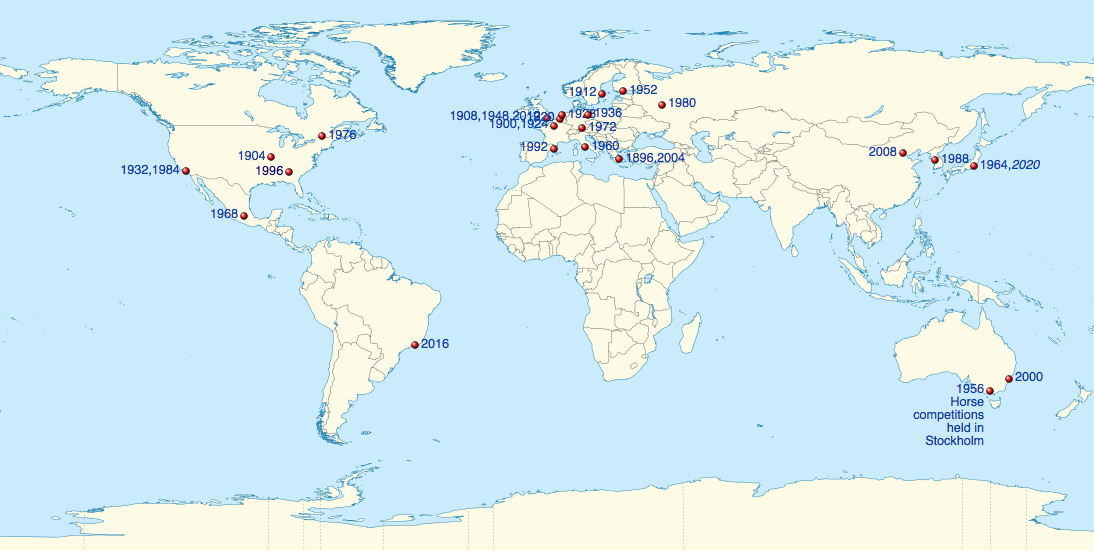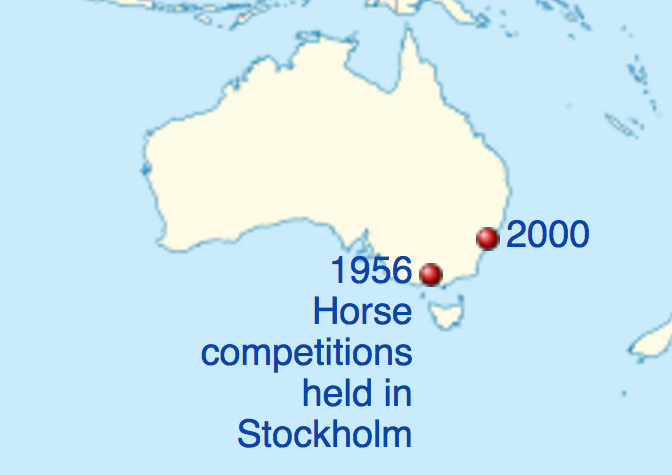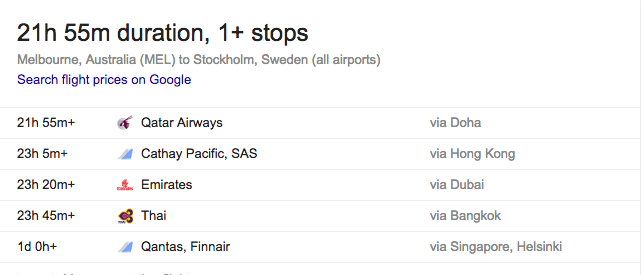Horse, Off-Course
The Summer Olympics — world wars aside — have occurred every four years since 1896. The 2016 Rio Games are the first time that a South American nation has played host and only the third time that the host city has called the Southern Hemisphere home; the other two were the 1956 Melbourne and 2000 Sydney Games, both in Australia — kind of. Here’s a map, via Wikipedia, of the locations of all the Summer Games to date (and Tokyo’s upcoming 2020 Games). If you look at Australia, you’ll notice something a bit weird.

Let’s zoom in a bit to make it easier to read:

“Horse competitions held in Stockholm.”
There’s no Stockholm in Australia — that note refers to the capital of Sweden. And that’s a pretty long way to go just to hold one set of events. Here’s a screenshot of a Google search for “Melbourne to Stockholm,” and as you can see, the latter is a day away from the former:

So, why didn’t Australia host the horse events? Because Australia wouldn’t let the horses into the country.
Equestrian events are a bit different than most other Olympic events in that the athlete’s equipment is alive. Unlike ping pong rackets, swimsuits, kayaks, and shot puts, horses come with all sorts of germs and diseases and stuff like that. When Australia was awarded the Games in 1949, no one thought anything of it. But the country — which has a long history of problems with invasive species — had rather strict regulations when it came to the importation of animals, even if they’re just visiting. Horses, for example, had to be imported six months prior to whenever they were needed and were expected to be held in quarantine during that intermediate period. And in 1953, Australia told the IOC that it wasn’t willing to waive that requirement even for Olympians.
Losing six months of pre-Games training was a non-starter for Olympic athletes, putting the host nation and the IOC at an impasse. So the IOC decided to move the equestrian events elsewhere — despite the fact that the Olympic charter, per Australia’s Daily Telegraph, specifically demanded otherwise. (The since-revised charter then read “the events must all take place in or as near as possible to the city chosen and preferably at or near the stadium. The city chosen cannot share its privilege with another.”) In May of 1954, the IOC voted to award the equestrian events to Stockholm.
This created a weird gap, both on the calendar and on the map. Because Stockholm’s summer months were June through August, having the equestrian events take place at the same time as the Melbourne games — November/December — was not an option. So in June, 159 competitors from 29 nations (including Australia, oddly enough) took to horseback in six events. There was even a separate Opening Ceremony; Horse Nation reports that the participants all came in riding their steeds.
Sweden did more than just host the event, too — they performed very well, winning three gold medals. (This wasn’t out of the ordinary; the Swedes took four golds in 1952.) Germany took two golds, three silvers, and a bronze, to lead the total medal count. But the most interesting medal result was probably the bronze in team dressage — that went to Switzerland, which didn’t win any other medals in the 1956 Games. They couldn’t, because Sweden didn’t bother sending any athletes to Melbourne. So officially, Switzerland has a bronze medal in the 1956 Summer Olympics in Australia, despite not having any athletes in that country at the time.
Bonus fact: In recent years, the problem of transporting horses across international borders has been somewhat alleviated by a pretty simple solution: passports, but for horses. According to the Rio 2016 website, the passports contain “detailed physical description, with diagrams, a list of competitions competed in and a list vaccinations taken.” Basically, they exist so that officials can identify the horse as the horse its owners claim it to be, and to get a glimpse of its medical history. (A picture of a horse passport can be seen at that link.)
From the Archives: Down the Rabbit Hole: A story of animals in Australia that probably shouldn’t have been there.
Related: The official poster (replica, of course) of the 1956 Stockholm Games.
